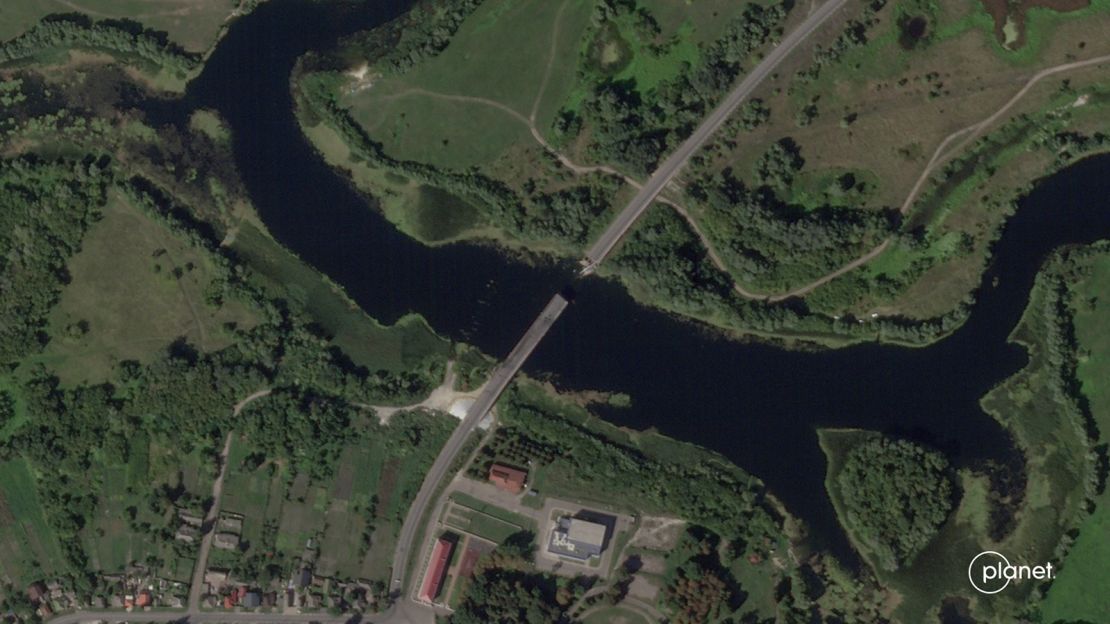CNN
—
Ukraine’s bold cross-border advance into Russia has seen troops continue to dismantle key bridges in the country’s west, while Moscow’s mayor on Wednesday accused Kiev of attempting to launch “the biggest ever” drone strikes in the capital.
Since the Ukrainian incursion began nearly two weeks ago, its forces have been advancing in Kursk and destroying key bridges in an attempt to cripple Moscow’s logistical capabilities and disrupt supply lines.
At least two bridges over the Sem River in Kursk were removed last week. Ukraine said it used “precision airstrikes” for one, while Russia said Kiev used Western rockets for the other.
Later, according to satellite images from PlanetLabs and BlackSky, Russia built at least three pontoon bridges — temporary floating bridges used in emergency or wartime situations — across the river.
Since then, a Ukrainian drone has targeted one of the pontoons, according to video obtained and geolocated by CNN.
The type of drone used is designed to explode on impact with a target, detonating its warheads and destroying the drone. Compared to traditional, large military drones that launch missiles and return to base, these are small and difficult to detect, and can be fired from a distance.
The video shows the drone striking one of the vehicles used to set up and move the pontoon bridge. While it’s unclear whether the drone destroyed the vehicle, BlackSky satellite images on Tuesday showed the bridge was gone — with major burns in the area.
In another stretch of nearby river, satellite images show a new pontoon bridge stretching across the water. A third pontoon bridge was also seen in satellite images from the European Space Agency and the Planetary Observatory.
The Kursk Offensive left Russia struggling to dissolve its own territory. On Tuesday, Ukrainian army chief Oleksandr Chirsky said its troops had advanced 35 kilometers (21.7 miles) through Russian defenses since capturing 93 settlements.
Ukrainian President Volodymyr Zelensky said the incursion aimed to create a “blocking zone” to prevent cross-border attacks by Moscow’s forces, disrupt Russia’s economy and “destroy as much Russian combat power as possible”.
On the same day, US Pentagon press secretary Major General Patrick Ryder said Russia has so far “really struggled to respond, and you continue to see some Ukrainian advances in that regard” – even as Moscow moves “a small number of forces”. In the Kursk region.
“It has certainly demonstrated the creativity and battlefield prowess of the Ukrainians, but when it comes to what their long-term objectives will be, we are still discussing with them,” he said.
Ryder would not say where the U.S. sees Russian forces being moved.
Last week, CNN reported that Russia had returned several thousand troops from occupied territory in Ukraine to the city of Kursk.

Russian officials have urged residents of border areas, as well as military and other personnel, not to use dating apps or social media to prevent Ukrainian forces from gathering intelligence.
“Use of online dating services is strongly discouraged. The enemy is actively using such sources for information gathering,” Russia’s Interior Ministry said in a Telegram post, part of an advisory to residents and troops in the Bryansk, Kursk and Belgorod border regions.
It includes a long list of recommendations, including not opening hyperlinks in messages from strangers, not streaming videos on roads with military vehicles and removing geotagging on their social media.
Russian officials said Wednesday that their air defense systems destroyed 45 Ukrainian drones overnight: including 11 over Moscow, two in the Belgorod border region and two in Kursk.
“This is one of the largest attempts to attack Moscow by drones of all time,” Moscow Mayor Sergei Sobyanin said in a Telegram post on Wednesday.
Reuters reported that Sobyanin said some of the drones were destroyed over the town of Podolsk, about 38 kilometers (24 miles) south of the Kremlin.
Sobyanin was quoted as saying that preliminary reports indicate no injuries or damage so far. Reuters could not independently verify his comments, and there was no immediate comment from Ukraine.
Ukraine has carried out drone attacks in the Russian capital before – most notably in July 2023 when drones struck two non-residential buildings, including one near the headquarters of the Ministry of Defense. There was no serious damage or casualties at the time, Sobyanin said later.
In November, Russia said it had foiled more than 20 Ukrainian drone attacks, including in Moscow — which came shortly after Russia launched its largest drone strike against the Ukrainian capital since the full-scale invasion began.



